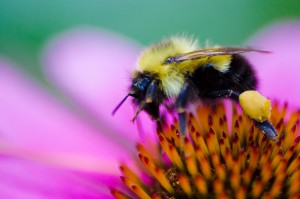24
Apr
Research Finds Bees Prefer Foods Treated with Bee-Killing Insecticides
(Beyond Pesticides, April 24, 2015) Two new studies reporting on the adverse effects of neonicotinoids on bees were published Wednesday in the journal Nature, adding to a growing body of scientific literature linking the controversial class of pesticides to the global decline in bee populations. The conclusions reached by the two studies find that not only does neonicotinoid exposure result in reduced bee density, nesting, colony growth, and reproduction, but also that bees in fact prefer foods containing neonicotinoid pesticides despite their adverse effects.
Neonicotinoids affect the central nervous system of insects, resulting in paralysis and eventual death. These pesticides have consistently been implicated as a key issue in pollinator declines, not only through immediate bee deaths, but also through sublethal exposure that causes changes in bee reproduction, navigation, and foraging. The science has become increasingly clear that pesticides, either working individually or synergistically, play a critical role in the ongoing decline of honey bees. Pesticide exposure can impair both detoxification mechanisms and immune responses, rendering bees more susceptible to viruses, parasites, and other diseases, and leading to devastating bee losses.
affect the central nervous system of insects, resulting in paralysis and eventual death. These pesticides have consistently been implicated as a key issue in pollinator declines, not only through immediate bee deaths, but also through sublethal exposure that causes changes in bee reproduction, navigation, and foraging. The science has become increasingly clear that pesticides, either working individually or synergistically, play a critical role in the ongoing decline of honey bees. Pesticide exposure can impair both detoxification mechanisms and immune responses, rendering bees more susceptible to viruses, parasites, and other diseases, and leading to devastating bee losses.
In one study, “Seed coating with a neonicotinoid insecticide negatively affects wild bees,” Swedish scientists report that wild bees and bumblebees foraging in crops treated with a commonly used insecticide seed coating, a combination of the neonicotinoid clothianidin and the non-systemic pyrethroid β-cyfluthrin, were less likely to reproduce when compared to bees in untreated fields, and that bumblebee colonies in treated fields gained less weight. Additionally, fewer wild bees and bumblebees were found in treated fields than in untreated ones.
The second study, “Bees prefer foods containing neonicotinoid pesticides,” finds that contrary to theories that bees would avoid treated plants because neonicotinoids taste bad, results find that honeybees and bumblebees were unable to taste the compounds, apparently consuming it anyway even though consumption of these pesticides caused them to eat less food overall.
According to The New York Times, this finding, which emerged from a broader test of bees’ sensitivity to chemicals in their food, was a complete surprise, said one author of the study, Geraldine Wright, Ph.D., of the University of Oxford.
The studies come on the heels of the U.S. Environmental Protection Agency’s (EPA) announcement of a moratorium on new uses of neonicotinoids. Also this month, the home and garden retailer Lowe’s announced its commitment to phasing out the sale of products containing neonicotinoid pesticides within 48 months.
With one in three bites of food reliant on bees and other insects for pollination, the decline of honey bees and other pollinators due to pesticides, and other man-made causes demands immediate action. For more on this and what you can do to protect pollinators, visit Beyond Pesticides’ BEE Protective webpage.
Source: New York Times, Nature
Photo Source: Eric S, MA
All unattributed positions and opinions in this piece are those of Beyond Pesticides











Stop this madness
May 5th, 2015 at 6:19 pmStop this madness.
May 6th, 2015 at 11:22 pmOnce there gone, we’re next in line!
June 12th, 2015 at 11:18 am